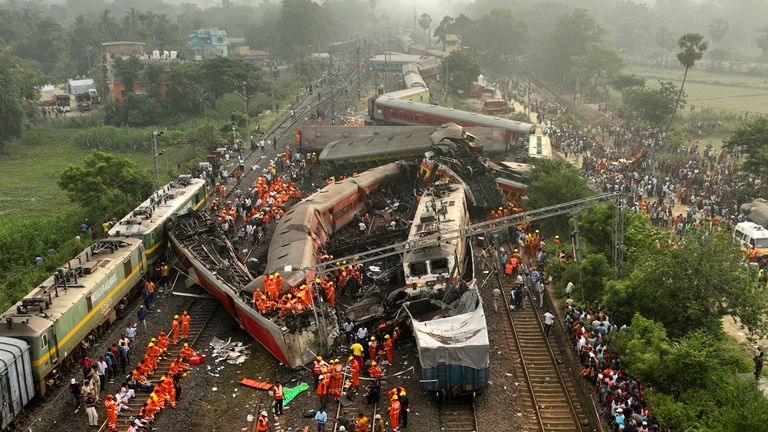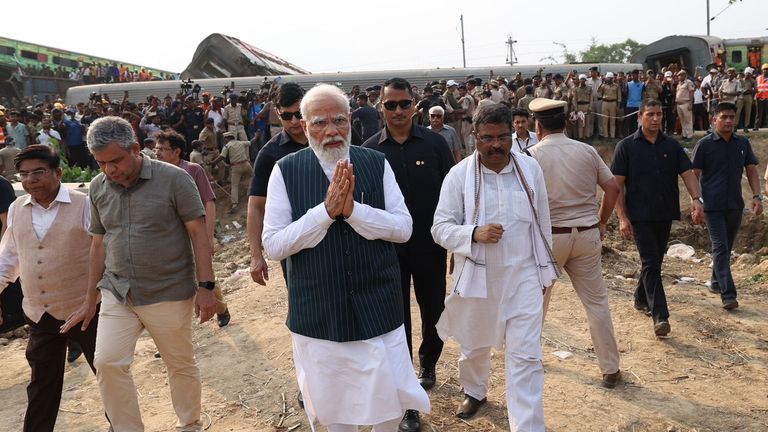Prime Minister Narendra Modi says those responsible for the deadly train crash in India will receive the "harshest punishment".
More than 300 people were killed and 900 injured in Friday's accident in Odisha's Balasore district, with the number of dead having risen after 15 bodies were recovered on Saturday night.
On his visit to the crash site earlier in the day, Mr Modi pledged to look after the families of those killed and injured.
He said: "This is a very big, painful and disturbing incident.
"Those family members who have been injured, the government will leave no effort for their well-being."
The Indian leader said the government "is with the families in their hour of grief", and said "all types of enquiries" had been ordered to determine the cause of the accident.
"The guilty should get the harshest punishment - they will not be spared," he warned.
A preliminary report has indicated that a signal failure caused a passenger train to come off the tracks and hit another passenger train.
A freight train was also involved in the incident, which happened at around 7pm local time on Friday.
K S Anand, chief public relations officer of the South Eastern Railway, said: "The Coromandel Express was supposed to travel on the main line, but a signal was given for the loop line instead, and the train rammed into a goods train already parked over there.
"Its coaches then fell onto the tracks on either side, also derailing the Howrah Superfast Express."
Sudhanshu Sarangi, director of Odisha state's fire and emergency department, has said there are no more survivors among the wreckage, adding: "This is very, very tragic - I have never seen anything like this in my career."
Hundreds of those severely injured are in hospital and there are still some bodies to be recovered from the debris, so the death toll is likely to rise.
A local school was being used as a makeshift morgue and police were helping people identify dead relatives, whose bodies were covered with white cloths and placed inside chained bags.
Mr Modi talked to rescue workers and inspected the wreckage on Saturday. He also met survivors.
"Words can't capture my deep sorrow," he said.
"We stand committed to providing all possible assistance to those affected."
Read more:
How safe is India's rail network?
Families of the dead will receive one million rupees (£9,700), while the seriously injured will get 200,000 rupees (£1,950), with 50,000 rupees (£485) for minor injuries, railway minister Ashwini Vaishnaw said.
Some state governments have also announced compensation.
Opposition Congress party leader Jairam Ramesh said the accident proved that safety should be prioritised on the rail network.
Mr Modi's government launched high-speed trains to modernise the network, but critics say there needs to be more focus on safety and maintenance of the ageing infrastructure.
https://news.google.com/rss/articles/CBMic2h0dHBzOi8vbmV3cy5za3kuY29tL3N0b3J5L2luZGlhLXRyYWluLWNyYXNoLW5hcmVuZHJhLW1vZGktdm93cy10aGUtaGFyc2hlc3QtcHVuaXNobWVudC1mb3ItdGhvc2UtdG8tYmxhbWUtMTI4OTU4ODLSAXdodHRwczovL25ld3Muc2t5LmNvbS9zdG9yeS9hbXAvaW5kaWEtdHJhaW4tY3Jhc2gtbmFyZW5kcmEtbW9kaS12b3dzLXRoZS1oYXJzaGVzdC1wdW5pc2htZW50LWZvci10aG9zZS10by1ibGFtZS0xMjg5NTg4Mg?oc=5
2023-06-04 04:07:30Z
2107687528




Tidak ada komentar:
Posting Komentar